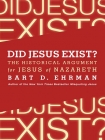Did Jesus Exist? - The Historical Argument for Jesus of Nazareth Bart Ehrman (books to read in your 20s txt) 📖

- Author: Bart Ehrman
Book online «Did Jesus Exist? - The Historical Argument for Jesus of Nazareth Bart Ehrman (books to read in your 20s txt) 📖». Author Bart Ehrman
However one resolves this issue, two points are of particular importance. One is that Matthew and Acts give disparate accounts of the event so that Acts here is an independent tradition. The other is that the Acts account gives clear evidence of being very early and Palestinian in origin: as happens occasionally in the Gospels, here too a key word is left in Aramaic (Akeldama means “Field of Blood”), the original language of the story. This is a tradition that goes back to the earliest Christian community in Palestine. Luke is not simply recording traditions from his own day, in the 80s CE; he is recording traditions that—some of them, at least—stemmed from as much as half a century earlier.
Moreover, that Luke has access to sayings of the historical Jesus not recorded otherwise, even in his Gospel, is clear from a passage such as Acts 20:35, where the apostle Paul is recorded as saying, “I have shown you that it is necessary by hard work to help the weak, and to remember the words of the Lord Jesus, that he said ‘it is more blessed to give than to receive.’” It is not necessary to think that the historical Paul—the man himself—really said this. What we have here is a narrative by a later author claiming that Paul said it. Whether Paul himself really knew this saying of Jesus can be argued. But what is clear is that Luke thinks he knew it and, more important for our considerations, that it is a tradition of a saying of Jesus that has no parallel in any of our Gospels. And so the book of Acts provides further evidence from outside the Gospels that Christians from earliest times believed that Jesus actually lived, as a Jew, that he was a moral teacher, and that he was killed in Jerusalem after being betrayed by one of his own followers, Judas.
The Speeches in Acts
Even more significant for our purposes are the speeches recorded in the book of Acts, placed on the lips of the apostles at key moments of the narrative. About a fourth of Acts is made up of speeches delivered by Peter in the first third of the book and Paul in the final two-thirds. Scholars have long been intrigued by these speeches. We know from ancient historians such as Thucydides that it was customary for historical writers to invent the speeches of their main characters. There really was no other way to present a speech in an ancient biography or ancient history: the authors were almost never there to hear what was actually said on the occasion, and almost never (if ever) did anyone take notes. And so, as Thucydides indicates, historians came up with speeches that seemed appropriate for the occasion.
But the speeches in Acts are particularly notable because they are, in many instances, based not on Luke’s fertile imagination but on oral traditions. The reason for thinking so is that portions of these speeches represent theological views that do not mesh well with the views of Luke himself, as these can be ascertained through a careful reading of his two-volume work. In other words, some of the speeches in Acts contain what scholars call preliterary traditions: oral traditions that had been in circulation from much earlier times that are found, now, only in their written forms in Acts. This is important information because, here again, it shows that Acts is not simply a document from the 80s CE. It incorporates much older traditions. And these traditions are quite emphatic that Jesus was a Jewish man who lived, did spectacular deeds, taught, and was executed, as a human, in Jerusalem.
One of the most striking features of several of the speeches in Acts is that they present a view of Jesus that scholars have long thought was one of the oldest, if not the oldest, Christian understanding of what it meant to call Jesus the Son of God. Eventually, of course, Christians came to think that Jesus had always been the Son of God, from eternity past, and that he came into the world only to conduct his miraculous ministry and deliver his supernatural teachings for a short while before returning to heaven whence he came. This is the view that can be found in the last of our Gospels, the Gospel of John. But this was not the earliest view of Jesus. Before anyone thought Jesus preexisted as the divine being who created the world (see John 1:1–18, for example), there were Christians who thought Jesus came into existence when he was born of a virgin and that it was because she was a virgin—and the “father” was God himself—that he was the Son of God.
This view seems to be embodied in the Gospel of Luke itself. Not a single word in Luke mentions Jesus preexisting his life on earth. Instead, his mother conceives of the Holy Spirit, and that is how he comes into being. As the angel Gabriel tells Mary at the Annunciation, informing her of how she will bear a child: “The Holy Spirit will come upon you and the power of the Most High will overshadow you. For that reason the one who is born of you will be called holy, the Son of God” (Luke 1:35). Here Jesus is the Son of God because God made his mother pregnant.
At an even earlier stage of the tradition, before Christians had begun to talk about either Jesus’s preexistence or his virginal conception, they (or some of them) believed that he had become the Son of God by being “adopted” by God to be his son. In this view Jesus was not metaphysically or physically the son





Comments (0)